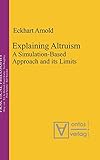Explaining Altruism : A Simulation-Based Approach and its Limits / Eckhart Arnold.
Material type: TextSeries: Practical Philosophy ; 11Publisher: Berlin ; Boston : De Gruyter, [2013]Copyright date: ©2008Description: 1 online resource (310 p.)Content type:
TextSeries: Practical Philosophy ; 11Publisher: Berlin ; Boston : De Gruyter, [2013]Copyright date: ©2008Description: 1 online resource (310 p.)Content type: - 9783110327304
- 9783110327571
- BJ1474 .A76 2008eb
- online - DeGruyter
- Issued also in print.
| Item type | Current library | Call number | URL | Status | Notes | Barcode | |
|---|---|---|---|---|---|---|---|
 eBook
eBook
|
Biblioteca "Angelicum" Pont. Univ. S.Tommaso d'Aquino Nuvola online | online - DeGruyter (Browse shelf(Opens below)) | Online access | Not for loan (Accesso limitato) | Accesso per gli utenti autorizzati / Access for authorized users | (dgr)9783110327571 |
Browsing Biblioteca "Angelicum" Pont. Univ. S.Tommaso d'Aquino shelves, Shelving location: Nuvola online Close shelf browser (Hides shelf browser)

|

|

|

|

|

|

|
||
| online - DeGruyter Basic Belief and Basic Knowledge : Papers in Epistemology / | online - DeGruyter Modes of Existence : Papers in Ontology and Philosophical Logic / | online - DeGruyter Perspectives on Perception / | online - DeGruyter Explaining Altruism : A Simulation-Based Approach and its Limits / | online - DeGruyter Pluralistische Gesellschaften und Vertragstheorien : Eine konstruktive Kritik der hobbesianischen Vertragstheorie / | online - DeGruyter Natürlich gut : Aufsätze zur Philosophie von Philippa Foot / | online - DeGruyter Das Problem der Handlungsverursachung : Eine kritische Untersuchung zur kausalen Handlungstheorie / |
Frontmatter -- Contents -- Chapter 1: Introduction -- Chapter 2: The riddle of altruism -- Chapter 3: The generalized theory of evolution as theoretical framework -- Chapter 4: Modeling the evolution of altruism -- Chapter 5: Empirical research on the evolution of altruism -- Chapter 6: Learning from failure -- Chapter 7: Summary and final reflections -- Chapter 8: Appendices -- Backmatter
restricted access online access with authorization star
http://purl.org/coar/access_right/c_16ec
Employing computer simulations for the study of the evolution of altruism has been popular since Axelrod's book „The Evolution of Cooperation“. But have the myriads of simulation studies that followed in Axelrod's footsteps really increased our knowledge about the evolution of altruism or cooperation? This book examines in detail the working mechanisms of simulation based evolutionary explanations of altruism. It shows that the „theoretical insights“ that can be derived from simulation studies are often quite arbitrary and of little use for the empirical research. In the final chapter of the book, therefore, a set of epistemological requirements for computer simulations is proposed and recommendations for the proper research design of simulation studies are made.
Issued also in print.
Mode of access: Internet via World Wide Web.
In English.
Description based on online resource; title from PDF title page (publisher's Web site, viewed 28. Feb 2023)


